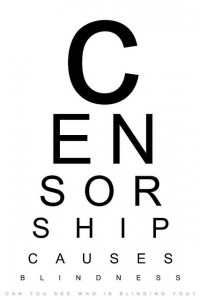Censorship on the majority of Russian television channels has been around forever but a recent open letter by REN TV [1] reporters showed how even remaining small islands of media freedom could get washed away by a tsunami of political paranoia.
The letter [2] [ru] written on the behalf of REN TV news service employees appeared on the website of anti-government politician Vladimir Ryzhkov. It accused the management of REN TV, one of the largest private television channels in Russia, of blacklisting members of Russian opposition and shying away from the topic of human rights abuse and social problems:
Уже составлены «черные» списки политиков, которых запрещено показывать. Среди них такие известные деятели оппозиции как Борис Немцов и Гарри Каспаров. Запрещена всякая критика «Единой России» и ее лидеров. Кардинально изменилась вся информационная политика канала. Вместо репортажей о социальных проблемах, борьбе правозащитников и произволе чиновников эфир занят криминальными новостями, сообщениями об успехах «силовиков» и «заказными» сюжетами, восхваляющими губернаторов и депутатов.
Devalued journalism
Managers of REN TV dismissed the accusation and called the authors of the letter “fools.” But bloggers took the side of the authors and condemned censorship in Russia media.
Finam FM radio host Yuri Pronko wrote [4] [ru] on his blog:
Профессия журналиста в России полностьюдевальвировалась. Журналистики сейчас как таковой в стране практически не осталось. Есть только видимость, как и видимость публичной политики. Все превратилось в сплошную болтовню, в болтологию.
Сложно оставаться в профессии, тем более заниматься политической журналистикой, если поля для этой профессии нет! Последний бастион свободы на ТВ, которая еще наблюдалась на канале РЕН, вот-вот рухнет. Все чаще журналисты подвергают себя самоцензуре, самоконтролю, неисполнение которого чревато потерей работы.
Journalism as a profession in Russia has been completely devalued. Journalism as such does not exist in the country. There is only an appearance [of journalism], the same as an appearance of politics. Everything has been turned into chatter.
It is difficult to stay in the profession and especially practice political journalism if there is no space for this. The last bastion of television freedom that one could see on REN TV is about to collapse. More often, journalists practice self-censorship, self-control and can lose their jobs for not doing it.
Oleg Kozyrev (oleg-kozyrev) draws attention to the graph [5] [ru] by Internet analysis company Medialogiya [6]. The graph shows that REN TV did reduce the coverage of Boris Nemtsov, an outspoken critic of Russian government, from January to April this year. At the same time, the coverage of the ruling party United Russia remained high.
Other netizens showed little surprise with censorship on REN TV. “Elections are near and Russian traditions are strong,” Georgian blogger olegpanfilov2 wrote [7] [ru], “Before elections, there are either blasts or nationalization of media.”
“Closer to elections, they clear what hasn't been cleared before,” svorodnikov echoed [8] [ru].
“This is Medvedev's modernization in full swing,” blogger drandin concluded [9] [ru]. “This is Medvedev's ‘freedom is better than non-freedom.'” [a reference to the famous quote [10] by Medvedev]
But it looks like some bloggers expected an open resistance toward censorship on REN TV. Apparently, the anonymous letter reminded people of a widely spread practice in the Soviet Union, when an unnamed letter could easily put an innocent person in prison.
Blogging on Slon.ru, Vasiliy Gatov criticized [11] [ru] the authors of the letter for not disclosing their names:
Задумайтесь: даже если это действительно написано кем-то из работников службы новостей РЕН ТВ, анонимность означает только одно: этим людям так хочется работать в «ящичке», так важен этот сомнительный наркотик, что они скрывают свои имена (опасаясь за свои теплые рабочие места с соцпакетами), вскрывая между тем вполне отвратительные методы нового руководства.
Old news and new ways
Prominent Russian journalists have occasionally warned about the demise of country’s media. Vladimir Pozner, a famous television host, recently said [12] that self-censorship in Russia nowadays was “at an all-time high.”
In an earlier interview with PBS Frontline [13], Pozner also talked about the lack of “different views” on Russian television networks. Professional media practitioner, Pozner is notorious for underlying the principle of Russian self-censorship by citing famous Russian poet Yevgeny Evtushenko:
An educated neighbor of Galileo
Was as smart as Galileo himself.
He knew that the Earth rotates,
But he also had a family.
The phenomenal speech [14] [ru, with English subtitles] by prominent Russian journalist Leonid Parfenov at the end of 2010 on media freedom, provoked a reaction within the media community but did not change the situation regarding media censorship. Symbolically, the speech found its way to people through blogs and social media since many television channels cautiously refrained from broadcasting it.
It may be all too logical for outspoken Russian reporters to go online and abandon traditional media channels. After all, people do regard blogs and online news portals more open than old media.
But radio, television and newspapers still hold the attention of the majority of Russians and serve as the primary sources of information for people in different corners of the country. The development of the Internet may bring something that, according to Pozner, Russian people never had and therefore could never desire: freedom of speech.
